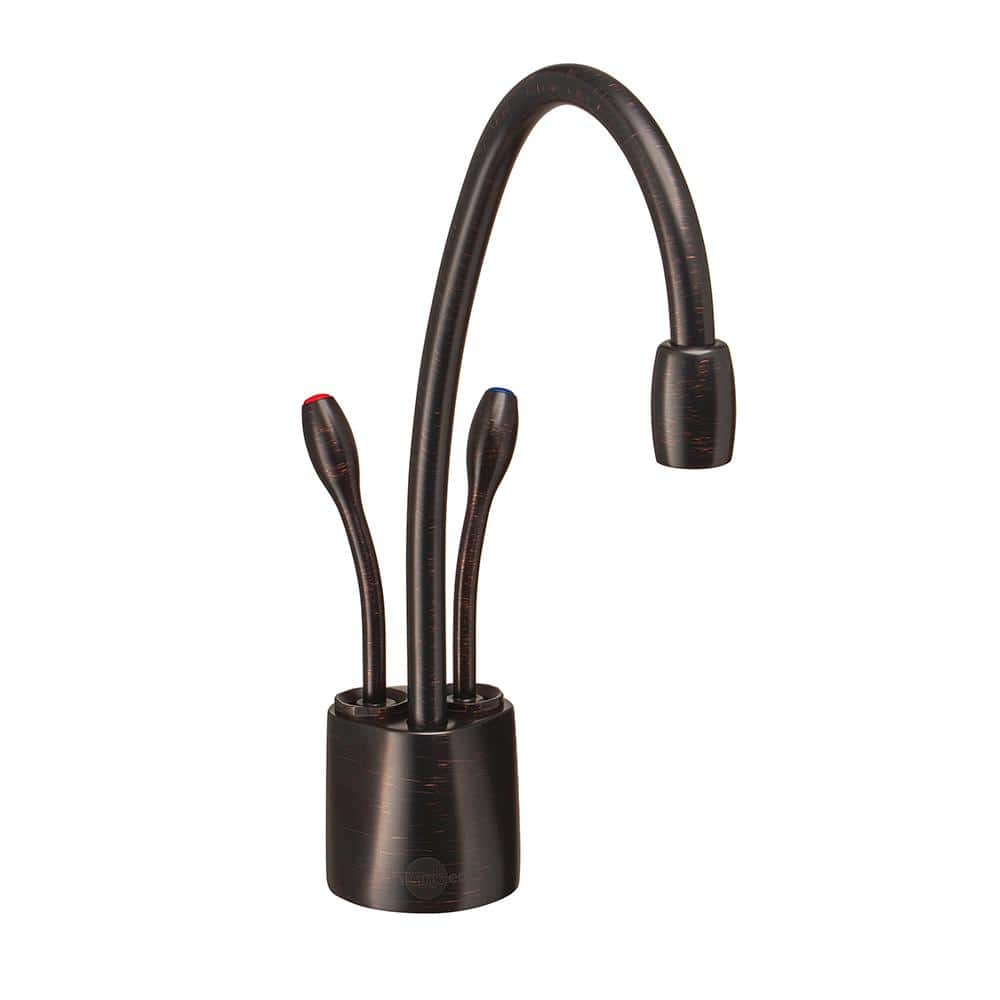InSinkErator Indulge Contemporary Series 2-Handle 8.4 in. Faucet for Instant Hot & Cold Water Dispenser in Classic Oil Rubbed Bronze
2-Handle Oil Rubbed Bronze Deck Mount Swivel Faucet. Durable All Brass Faucet Fits Standard 1.25″ – 1.5″ Hole. Backed by our 5-Year “We Come to You” Limited In-Home Warranty.
The InSinkErator Indulge 2-Handle Hot/Cool Water Dispenser Faucet in Classic Oil-Rubbed Bronze has an auto shut-off hot lever to prevent waste. It is designed for use with the InSinkErator Hot Water Tank and filtration system (not included). The graceful, high-arching spout swivels to make it easy to fill pitchers and pots. It has a sleek, contemporary design in brass and chrome that can complement almost any kitchen decor.
- Compatible with InSinkErator HWT-F1000S Series Hot Water Dispenser Tank & Filtration System (sold separately)
- Graceful, high-arch swivel spout makes filling pots & pitchers quick and easy
- Durable brass faucet dispenses near-boiling water up to 200°F
- Hot lever automatically shuts off, while the stay-on cool lever remains on for easy use
- Backed by InSinkErator’s 5-Year “We Come to You” Limited Service Warranty Covers Repair or Replacement by an Authorized Dealer
- NSF listed
- Available in several designer finishes
Additional information
| Connection size (in.) | 3/8 In. |
|---|---|
| Faucet Height (in.) | 8.38 |
| Spout Height (in.) | 8.38 |
| Certifications and Listings | NSF Certified |
| Manufacturer Warranty | 5 year parts and in home service |






by Win
This is my 3rd FHC1100 in 11 years. The 1st one was replaced under warranty and this is the 3rd set. Even though it does not last longer than I like, it does look stylish & very convenient. If you do not mind replacing it in every 4 years, it performs well as long as it lasts.
by Knuckel
Directions were easy to read and understand. Color coded hoses and couplings of different sizes made the job a no brainer snap.
by Dettie
This is actually our second Insinkerator Hot/Cold faucet. Our first one lasted about 15-16 years before needing to be replaced. I’m sure anyone with basic plumbing knowledge could install this, especially as a replacement, but since we had a plumber coming to fix some other issues, we had him install this too. I love having instant hot water for my tea. This unit bypasses our water softener so it’s our go-to for any drinking.
by Inan
Fast Delivery, Beautiful bronze finish wrapped and delivered in perfect condition. Parts and instructions included. Easy replacement and install. First one lasted 12 awesome years!! We love love our InstaHot:)
by Michelle
I’ve been wanting to add an instant hot water faucet that matched my new Delta faucet in champagne bronze for a couple of years now. When I saw that this one featured FILTERED hot AND cold water dispensing I knew it was time to invest. This faucet has simplified my life and knowing that the hot water I’m making my teas and soups with is filtered is very reassuring. Also, the cool water it dispenses makes filling the coffee maker with fresh filtered water so easy. The design fits my aesthetic perfectly.
by Dana
Smooth operation with the filter system i have installed as well as an insta-hot. This is definitely an investment but you get what you pay for.
by Phyllis
This product makes life so much easier – no kettles, no waiting. Instant hot water to make tea any time of the day.